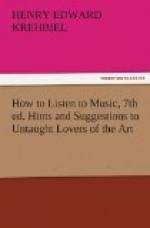[Sidenote: Selfishness fatal to success.]
[Sidenote: Tonal balance.]
Yet back of all this exercise of individual skill there must be a spirit of self-sacrifice which can only exist in effective potency if prompted by universal sympathy and love for the art. A selfish chorister is not a chorister, though possessed of the voice of a Melba or Mario. Balance between the parts, not only in the fundamental constitution of the choir but also in all stages of a performance, is also a matter of the highest consideration. In urban communities, especially, it is difficult to secure perfect tonal symmetry—the rule is a poverty in tenor voices—but those who go to hear choral concerts are entitled to hear a well-balanced choir, and the presence of an army of sopranos will not condone a squad of tenors. Again, I say, better a well-balanced small choir than an ill-balanced large one.
[Sidenote: Declamation.]
[Sidenote: Expression.]
[Sidenote: The choruses in “The Messiah."]
[Sidenote: Variety of declamation in Handel’s oratorio.]
I have not enumerated all the elements which enter into a meritorious performance, nor shall I discuss them all; only in passing do I wish to direct attention to one which shines by its absence in the choral performances not only of America but also of Great Britain and Germany. Proper pronunciation of the texts is an obvious requirement; so ought also to be declamation. There is no reason why characteristic expression, by which I mean expression which goes to the genius of the melodic phrase when it springs from the verbal,




